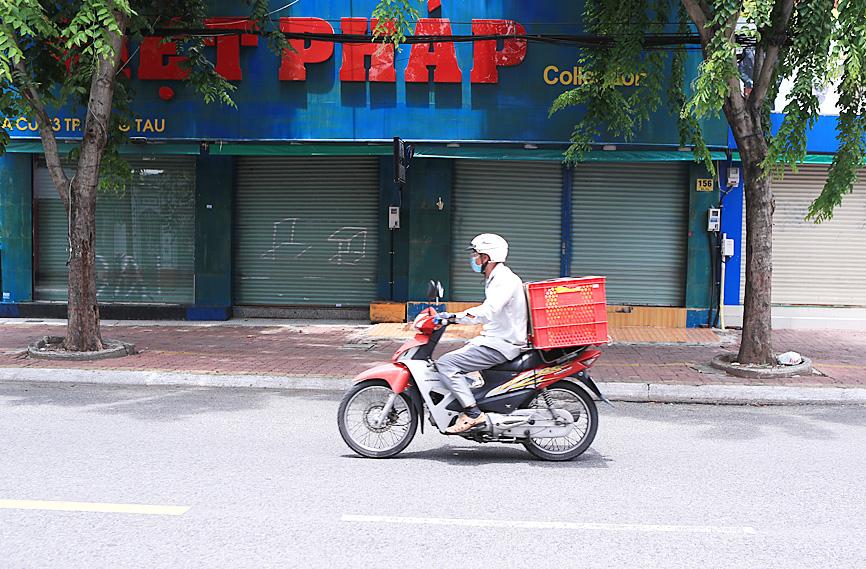Feng Tay Enterprises Co Ltd (豐泰), a supplier for Nike Inc, on Saturday temporarily shut down four factories in Vietnam, its biggest manufacturing base, for about a week amid COVID-19 lockdowns, it said yesterday.
Feng Tay is the latest in a slew of local manufacturers with operations in Vietnam that have suspended operations as the country grapples with its worst outbreak of COVID-19.
Pou Chen Corp (寶成工業), the world’s largest manufacturer of branded athletic and casual footwear, last week said that it had suspended operations at its plant in Ho Chi Minh City, as virus restrictions shuttered factories in the business hub through Friday. Pou Chen manufactures footwear for companies such as Nike and Adidas AG.

Photo: AP
Feng Tay halted operations at its major subsidiaries in Vietnam — Dona Victor Footwear Co, Dona Pacific (Vietnam) Co, Vietnam Dona Orient Co and Dona Victor Molds Manufacturing Co — through Friday, according to a company filing with the Taiwan Stock Exchange.
The company, based in Yunlin County’s Douliou City (斗六), said that the Vietnamese government has imposed stringent travel curbs in the Ho Lai and Pac Son areas, hindering some employees from working in the region.
Feng Tay would continue enhancing COVID-19 measures to prevent infections, it added.
Vietnam is Feng Tay’s biggest footwear manufacturing base, accounting for 52 percent of its total capacity, according to investors’ conference presentation material.
Last year, the Vietnamese factories produced 63 million pairs of sneakers, making up 56 percent of Feng Tay’s overall shipments of 112 million pairs.
Feng Tay last year shipped 9 percent fewer shoes than in 2019 as COVID-19-related restrictions in India forced the company to suspend production there for 37 days, leading to a 29 percent reduction in shipments annually from its Indian factories.
Feng Tay’s second-biggest manufacturing base is India, which contributes 26 percent to the company’s total capacity.
In May, Feng Tay shut down Indian factories for 18 days again due to outbreaks there.
Shoemaker Sports Gear Co (志強國際) yesterday also said it would suspend production at its Vietnamese factories for 14 days to Aug. 2 at the request of local governments.
The company plans to disinfect all factory areas during the period to help prevent COVID-19 infections, it said in a regulatory filing.
“As the third quarter is usually a slow season, the company would allocate production [from other factories] to reduce” the effects of the closures, Sports Gear said.
Textile supplier Eclat Textile Co (儒鴻), which counts Nike and Under Armour Inc among its customers, said it would extend shutdowns started on Saturday at its Vietnamese facilities to Friday.
Other Taiwanese companies with operations in Vietnam — including golf club producer Advanced International Multitech Co Ltd (明安國際), home decor manufacturer Ching Feng Home Fashions Co Ltd (慶豐富), bicycle components maker SR Suntour Inc (榮輪科技), Headway Advanced Materials Inc (展宇科技材料), Evertop Wire Cable Corp (億泰電線電纜) and King Chou Marine Technology Co Ltd (金洲海洋科技) — also said that they would suspend production at their Vietnamese units for up to two weeks.

Shiina Ito has had fewer Chinese customers at her Tokyo jewelry shop since Beijing issued a travel warning in the wake of a diplomatic spat, but she said she was not concerned. A souring of Tokyo-Beijing relations this month, following remarks by Japanese Prime Minister Sanae Takaichi about Taiwan, has fueled concerns about the impact on the ritzy boutiques, noodle joints and hotels where holidaymakers spend their cash. However, businesses in Tokyo largely shrugged off any anxiety. “Since there are fewer Chinese customers, it’s become a bit easier for Japanese shoppers to visit, so our sales haven’t really dropped,” Ito

The number of Taiwanese working in the US rose to a record high of 137,000 last year, driven largely by Taiwan Semiconductor Manufacturing Co’s (TSMC, 台積電) rapid overseas expansion, according to government data released yesterday. A total of 666,000 Taiwanese nationals were employed abroad last year, an increase of 45,000 from 2023 and the highest level since the COVID-19 pandemic, data from the Directorate-General of Budget, Accounting and Statistics (DGBAS) showed. Overseas employment had steadily increased between 2009 and 2019, peaking at 739,000, before plunging to 319,000 in 2021 amid US-China trade tensions, global supply chain shifts, reshoring by Taiwanese companies and

Taiwan Semiconductor Manufacturing Co (TSMC, 台積電) received about NT$147 billion (US$4.71 billion) in subsidies from the US, Japanese, German and Chinese governments over the past two years for its global expansion. Financial data compiled by the world’s largest contract chipmaker showed the company secured NT$4.77 billion in subsidies from the governments in the third quarter, bringing the total for the first three quarters of the year to about NT$71.9 billion. Along with the NT$75.16 billion in financial aid TSMC received last year, the chipmaker obtained NT$147 billion in subsidies in almost two years, the data showed. The subsidies received by its subsidiaries —

Taiwan Semiconductor Manufacturing Co (TSMC) Chairman C.C. Wei (魏哲家) and the company’s former chairman, Mark Liu (劉德音), both received the Robert N. Noyce Award -- the semiconductor industry’s highest honor -- in San Jose, California, on Thursday (local time). Speaking at the award event, Liu, who retired last year, expressed gratitude to his wife, his dissertation advisor at the University of California, Berkeley, his supervisors at AT&T Bell Laboratories -- where he worked on optical fiber communication systems before joining TSMC, TSMC partners, and industry colleagues. Liu said that working alongside TSMC